The Educational Policy and Accreditation Standards (EPAS) Curricular Guide Series serves as a supplemental guide for programs and educators on relevant topics in social work. Each resource is produced by a task force of national content experts. Users can select from and access the suggested resources for each of the nine social work competencies. Resources include full descriptions of in-class exercises and assignments.
Individuals may download free PDF versions of the 2015 EPAS curricular guides. Printed guides are also available for purchase for $25. Visit the CSWE Press online bookstore, email [email protected], or call 877-751-5053 to order a copy.
Specialized Curricular Guide on Service User Involvement in Social Work Education
The Council on Social Work Education (CSWE) is excited to announce the new Specialized Curricular Guide on Service User Involvement in Social Work Education. This specialized curricular guide will present a unique opportunity for volunteers to expand their professional horizons.
The term ‘Service User’ that will be used in this Guide refers to those individuals with lived experiential knowledge of social work, including having received services or support from a social worker, who will contribute to the educational experience of social work students based on this lived experience of social work.
The guide will serve as a supplemental resource for accredited social work programs and educators on planning and implementing service user involvement across the nine social work competencies adopted in the 2022 Educational Policy and Accreditation Standards (EPAS). The guide will be produced by a task force of national content experts. CSWE invite you to participate as a member of a international task force. Task force participants may include: CSWE members, social work professionals and/or interdisciplinary professionals.
By participating on this task force, you will be a part of an international effort to increase competence and expertise related to delivering a service user involved focus on social work education, field practicum, and social work. Your energy, expertise, and commitment will be central to extending and enhancing the nine social work competencies.
Applications for the Curricular Guide on Service User Involvement has now closed.
Revised Macro Specialization Curricular Guide Based on 2022 EPAS Now in Production
CSWE and the Special Commission to Advance Macro Social Work are pleased to announce our partnership to produce the second Specialized Practice Curricular Guide for Macro Social Work Practice.
Based on the 2022 Educational Policy and Accreditation Standards (EPAS), the forthcoming curricular guide will be updated and revised by fall 2025. As with the first curricular guide, this publication reflects the collaboration of the Special Commission with the Association for Community Organization and Social Action, the Network for Social Work Management, and Influencing Social Policy.
With this revision, we hope to again provide a highly informative, timely, and innovative publication to assist in building a robust macro curriculum balanced with micro/clinical content. This edition should be particularly important to MSW programs with an advanced generalist curriculum while also being useful for BSW programs.
Interested in Creating an EPAS Curricular Guide?
Individuals interested in creating an EPAS curricular guide can submit a request form. Check back soon for an updated EPAS curricular guide interest form.
.png) |
The Specialized Practice Curricular Guide for Health Social Work was developed as part of CSWE’s 2015 EPAS Curricular Guide Series. This guide is available to social work programs to enhance teaching about health social work and is one deliverable of Social Work Healthcare Education and Leadership Scholars (HEALS), a multi-faceted grant funded by the New York Community Trust (NYCT). The implementation of the Patient Protection and Affordable Care Act (ACA) recognized that there could be expanded roles for social workers to improve health care access, affordability, equity and quality. Social Work HEALS was created to pursue those opportunities and was implemented as a collaborative endeavor between national organizations: the National Association of Social Workers (NASW), the NASW Foundation, and CSWE. Read the full Executive Summary. An additional supplement to this curricular guide is NASW’s virtual forum, Reimagining Health and Social Work. The virtual event addressed important topics on interprofessional practice, integrated care, emerging leadership challenges in health care, links between climate change and health, community care for youth, advanced-care planning, telehealth, social work advocacy and health, and COVID-19 vaccinations. The recordings of all presentations led by HEALS participants are now available to all accredited social work education programs. Users are required to create a username and password if not already an NASW member. |
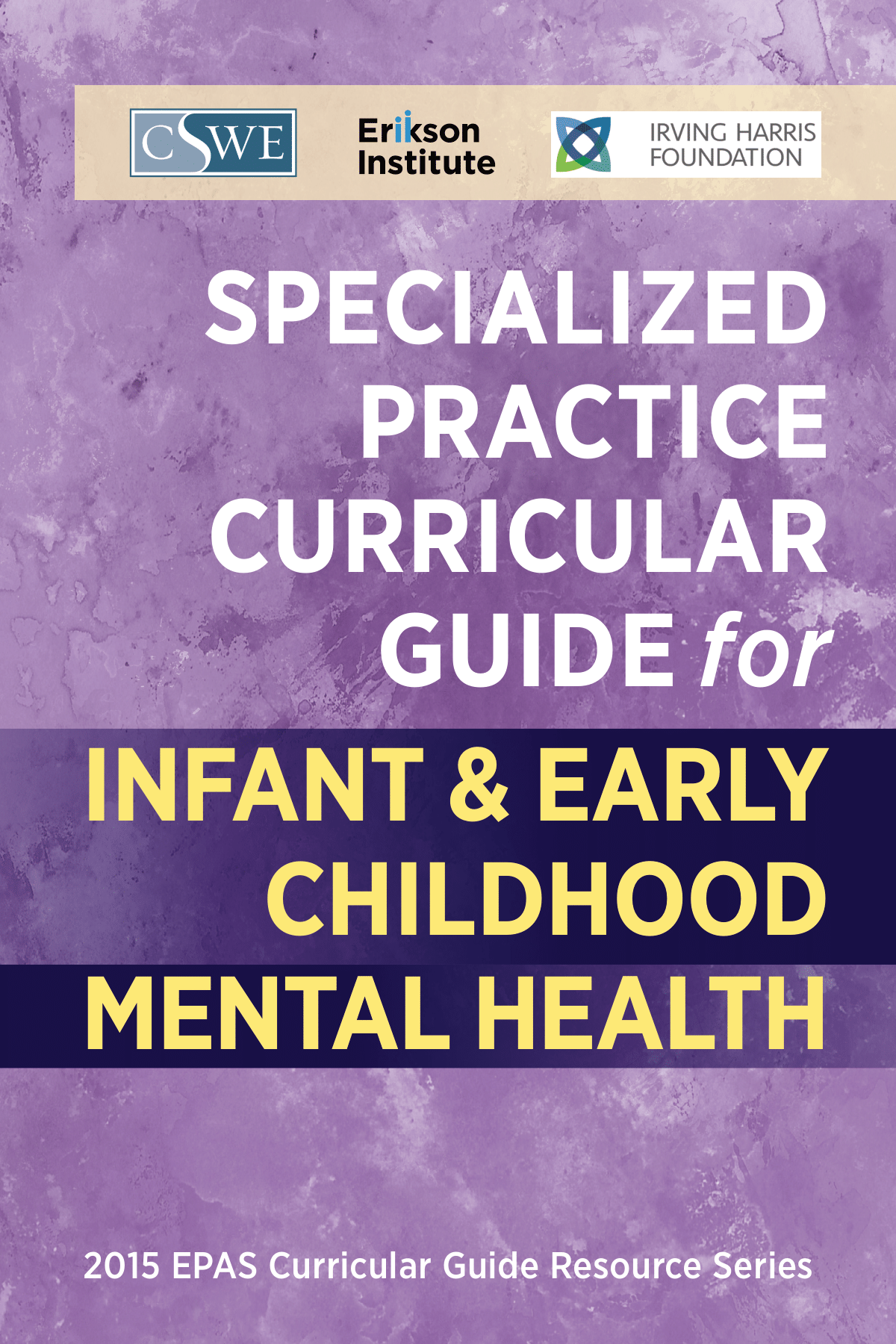 |
The Specialized Practice Curricular Guide for Infant & Early Childhood Mental Health (IECMH), part of the 2015 EPAS Curricular Guide Resource Series, was designed to address gaps in the preparation of social workers. This guide was developed through the generous support of the Council on Social Work Education, Erikson Institute, and Irving Harris Foundation. Using a competency-based approach, the specialized guide highlights IECMH content for social work curricula and can be used with generalist or specialized practice curricula. It also provides resources for educators desiring to expand this content in their baccalaureate and master’s programs and courses. |
| The Curricular Guide for Environmental Justice was developed by a task force of more than 60 national environmental justice experts to extend and enhance environmental justice content. Created through the support of the CSWE Center for Diversity and Social & Economic Justice, the Curricular Guide for Environmental Justice includes generalist environmental justice competencies. This comprehensive guide is easy to use and includes resources for students, educators, and field supervisors to understand and implement environmental justice in the classroom and in practice. CSWE would like to give special thanks to Rachel Forbes, MSW (University of Denver), Cathryne Schmitz, PhD, MSW (University of North Carolina Greensboro), and the national task force members for their dedication and work on this resource. |
|
.png?lang=en-US) |
The Specialized Practice Curricular Guide for Substance Use Social Work Practice is part of the 2015 EPAS Curricular Guide Resource Series. This guide is developed through the generous support of the American Academy of Addiction Psychiatry, the Council on Social Work Education, and funding (in part) by grant no. 6H79TI080816 from Substance Abuse and Mental Health Services Administration. This guide is intended to equip social work educators, educators in outside professions, and trainers to prepare future professionals for practice in substance use. The work highlights the dynamic and various settings, roles, and practice areas where an understanding of substance use is key. |
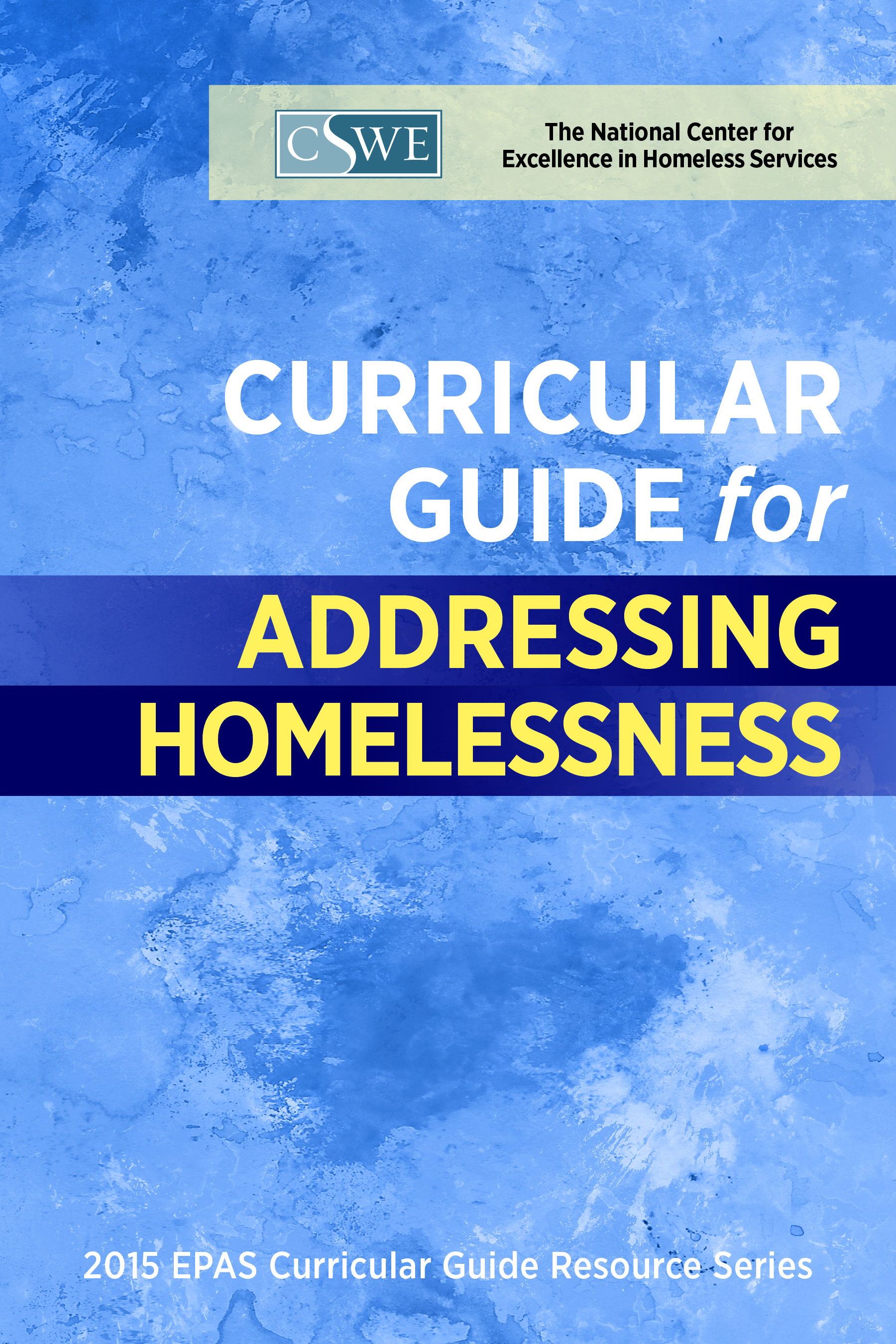 |
The Curricular Guide for Addressing Homelessness, part of the 2015 EPAS Curricular Guide Resource Series, provides tools for expanding information about homelessness in baccalaureate and master’s programs and courses. Developed in partnership with the National Center for Excellence in Homeless Services, a consortium of schools of social work, and with generous funding from the New York Community Trust, the guide is a resource to strengthen the context on homelessness in social work education and offer more opportunity to discuss how to address this topic. The guide will help prepare future social workers to play a critical role in ending homelessness through effective leadership, research, and advocacy for evidence-based programs, housing supports, and state-of-the-art service provision. Social workers can offer a comprehensive response that addresses individual vulnerability as well as societal conditions contributing to homelessness. |
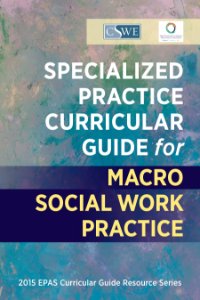 |
The Specialized Practice Curricular Guide for Macro Social Work Practice outlines three primary focus areas: organization administration and management, community organizing, and policy practice. The guide uses a unifying framework that identifies commonalities while honoring the unique differences of each focus area. |
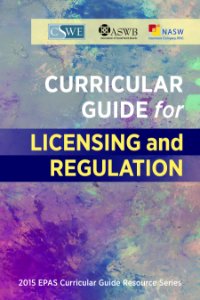 |
The Curricular Guide for Licensing and Regulation provides content information and strategies for educating students about social work licensure and regulation. The guide is designed to facilitate the integration of licensure and regulation education throughout social work curricula and programming. It can also be used as a resource to build student knowledge and reduce apprehension about the licensing process and social work regulation. Most importantly, this guide encourages social work educators, students, and practitioners to come together to ensure the protection of public consumers of social work services through licensed and regulated practice. |
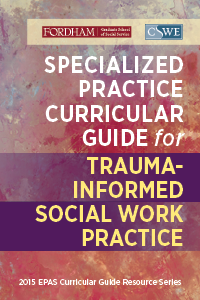 |
The Specialized Practice Curricular Guide for Trauma-Informed Social Work Practice addresses the needs of individuals, families, and communities increasingly exposed to toxic and traumatic stress and confronts issues involving justice, obtaining legal redress, and seeking protection against further harm. It also confirms trauma-informed practice as an essential component of social work education and provides competency information and tools to prepare future social workers for today’s specialized practice demands. |
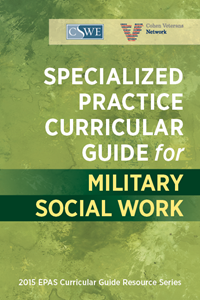 |
The Specialized Practice Curricular Guide for Military Social Work shows that military social work, as a field of practice and research, is critical to the relevance of social work, the advancement of new career options, and leadership among helping professionals. It proves that as social workers continue to exert their central influence in wartime and its aftermath, a vigorous social work research agenda and appropriate training to effectively prepare military social workers are needed. |
|
The Curricular Guide for Economic Well-being Practice defines the components of economic well-being and links the concept to the nine competencies. The connections to the social work competencies are further explicated in a curricular map that links recommended curriculum materials to the essential knowledge, values, skills, cognitive and affective processes, and behaviors related to economic well-being that support each competency. Information about curricular resources is also provided, linked to the competencies. This resource will provide the guidance needed to feature economic well-being prominently in social work education and better prepare students for today’s practice demands. |
|
|
The Specialized Practice Curricular Guide for Gero Social Work Practice, the first of the 2015 EPAS Curricular Guide Resource Series, serves a resource to help programs conceptualize specialized practice in aging and infuse aging into their curricula. The guide is a resource to faculty and field instructors who are educations students to work effectively with older adults and their constituencies which includes informal and formal support systems. This guide is brought to you by The John A. Hartford Foundation, the Social Work Leadership Institute, and the Council on Social Work Education. |
Curricular Resources
Shorter than the EPAS Curricular Guides, Curricular Resources are created by affinity groups. Curricular Resources are specialized content documents that may be used as a supplement in the classroom or in practice.
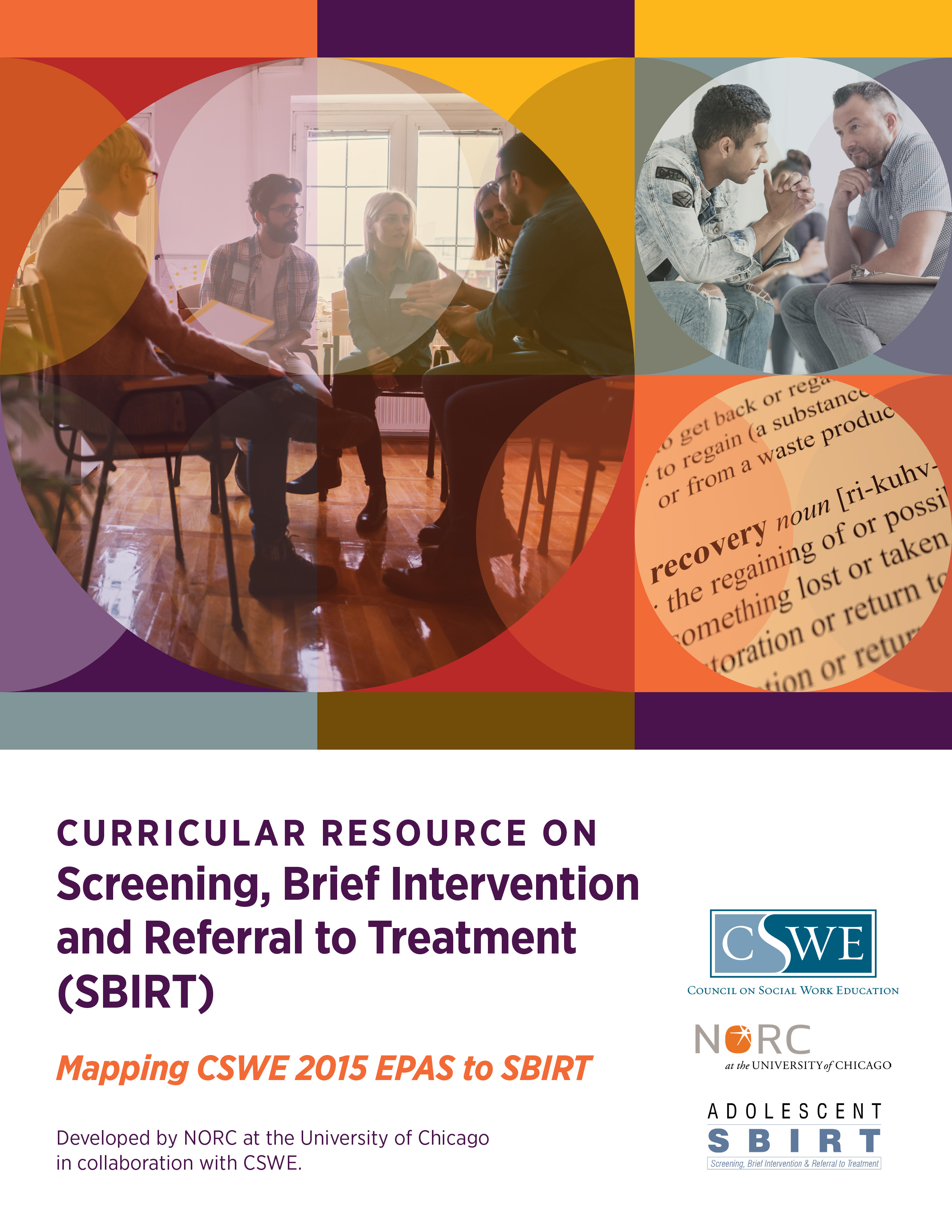 |
The Curricular Resource on Screening, Brief Intervention and Referral to Treatment (SBIRT) was developed through a national workforce development initiative to integrate adolescent SBIRT education into social work curriculum through a partnership between CSWE and the NORC at the University of Chicago. Screening, brief ntervention, and referral to treatment (SBIRT) is a comprehensive, integrated, public health approach to the delivery of screening and early intervention for substance use. This resource maps SBIRT education to the nine social work competencies outlined in the 2015 EPAS. Using a competency-based approach, this guide infuses SBIRT content into undergraduate and graduate social work curricula. The development of this guide was supported by funding from the Conrad N. Hilton Foundation. |
>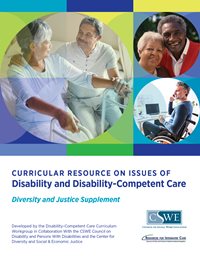 |
The Curricular Resource on Issues of Disability and Disability-Competent Care provides a foundation for integrating disability content into social work courses. It outlines how content on disability aligns with each of the nine 2015 EPAS Social Work competencies and provides specific classroom resources for social work educators. |
